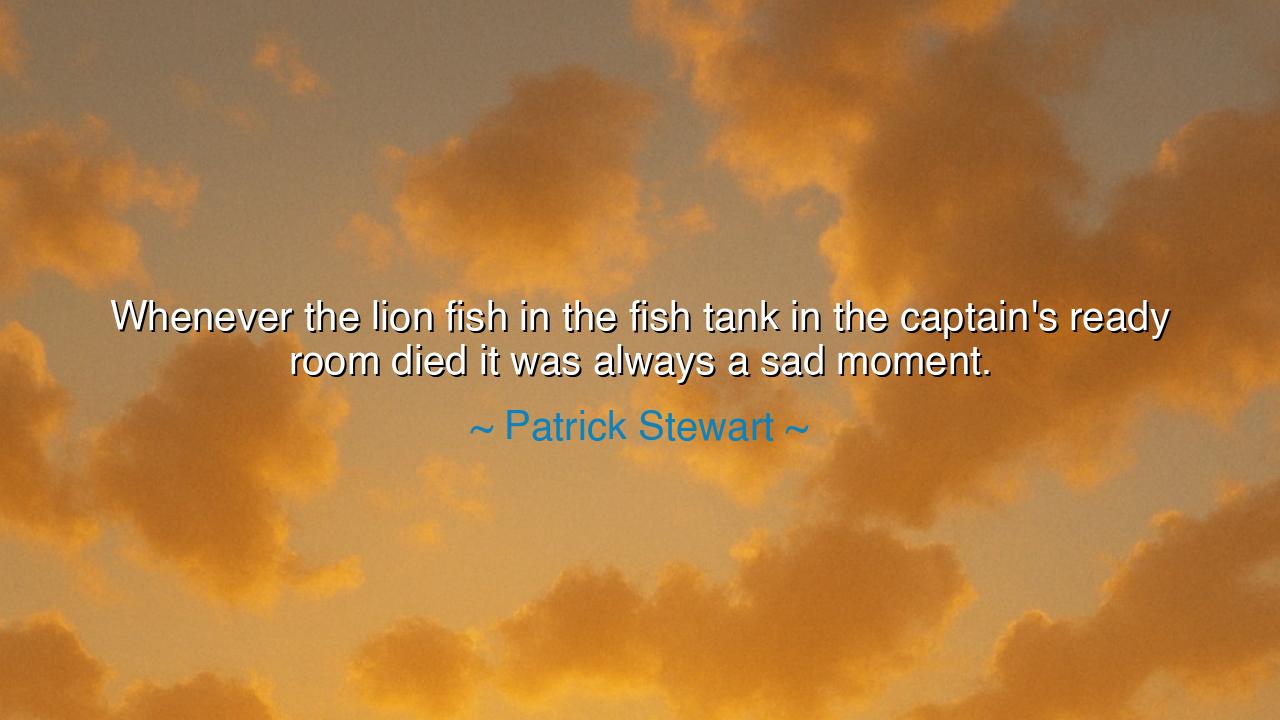
Whenever the lion fish in the fish tank in the captain's ready
Whenever the lion fish in the fish tank in the captain's ready room died it was always a sad moment.






Hear the words of Patrick Stewart, who, speaking of his days as captain in story and symbol, declared: “Whenever the lion fish in the fish tank in the captain’s ready room died it was always a sad moment.” At first, these words may seem small, a mere remembrance of a prop upon a set, yet they open into a truth as deep as the sea itself. For even in fiction, even in symbols, the passing of life carries weight, and the stillness of a fish in a tank can stir the same sadness as the silence left by a friend.
The lion fish, beautiful yet dangerous, became in that room not just a creature but a sign of presence, a companion to the captain amid the vast loneliness of command. Its life, contained within glass, was a reminder that even in a world of ships, stars, and endless journeys, there exists fragile beauty close at hand. And so, when it perished, there was always sorrow—not merely for the fish itself, but for what it represented: the fragility of existence, the inevitability of endings, and the reminder that even the strongest captains carry sadness within.
In this saying is also the echo of symbolism. The fish tank in the ready room was no idle decoration—it was a reflection of the captain himself. Just as the fish swam within invisible walls, so too did the leader of men and women swim within the invisible boundaries of duty, protocol, and expectation. When the lion fish died, it was as though a piece of the captain’s own spirit dimmed, reminding all who looked that leadership is not only strength, but also loneliness and grief carried quietly.
History, too, knows of such symbols. Consider the story of Alexander the Great, who kept with him not only soldiers and scholars, but also horses and animals he cherished. When his great horse Bucephalus died, Alexander wept as though for a brother, and built a city in his memory. To others, it was but a horse; to him, it was a companion in conquest, a symbol of loyalty and courage. So it was with the lion fish in Stewart’s memory—small to some, yet a bearer of meaning for those who understood.
The sad moment Stewart describes is a universal one. It reminds us that loss is not measured by the grandeur of what is lost, but by the bond it carried. A fish in a tank, a flower in a vase, even a trinket long carried in a pocket—when these are gone, the heart feels the emptiness, for they were part of our world, and their passing is a reminder that all things, great and small, must end. To grieve such losses is not foolishness but a sign of humanity’s capacity to love and to remember.
Thus, the lesson is clear: do not scorn the small sorrows of life. If the death of a fish can stir grief, then honor that grief, for it teaches compassion. Greatness is not only in triumph and strength, but in the tenderness to mourn what others might dismiss. He who allows himself to feel such sadness keeps his heart alive; he who denies it hardens into stone. To feel sorrow for even a lion fish is to remain awake to the sanctity of all life.
Practical is this counsel: when something small passes from your life—whether a pet, a possession, or even a fleeting moment—do not rush to dismiss your sadness. Let it remind you of how fragile and precious life is. Let it deepen your gratitude for what you still hold, and let it strengthen your resolve to cherish each living moment, however small. For one day, others will grieve your absence too, and in their tears will be the same truth: that life, however brief, carries meaning.
So remember Patrick Stewart’s words: “Whenever the lion fish in the fish tank died it was always a sad moment.” Behind them lies a teaching both tender and profound: that every life, every presence, every symbol matters. To mourn its passing is not weakness but wisdom. For in learning to grieve even the smallest loss, we prepare our hearts to face the greater storms of existence with courage, humility, and love.






AAdministratorAdministrator
Welcome, honored guests. Please leave a comment, we will respond soon